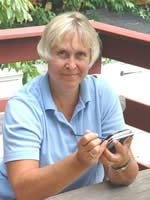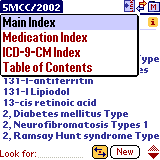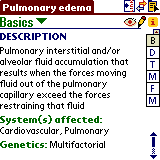 |
|
|
|
5MCC (5 Minute Clinical Consult), an application which covers more that 1000 clinical topics, is based on the book by the same name. The text by Griffith is updated yearly, as is the PDA program. Installation & Memory Requirements 5MCC is available in the Skyscape
format for the Palm OS and the Pocket PC. I found it very easy
to load this application onto my Palm
m515. As with other Skyscape products, the program loads without
much effort or thinking on my part. This is so important for those
of us who are novices. Part of the program automatically loads
to my memory card, saving much needed space on my Palm. Skyscape
lists the 5MCC as needing 3.8MB on the Palm. When I checked info
on my Palm it said the application on the Handheld was 173K with
the balance of the 3.8MB residing on the expansion card. Ease of Use & Navigation 5MCC provides a number of ways to locate information within the
application. I personally use the Main Index or type in the topic
in the'Look for' area.
I found the application to be user friendly and easy to navigate using the six tabs on the right hand side of the screen; Basics, Diagnosis, Treatment, Medications, Follow-up, and Miscellaneous.
To personalize the application, notes may be added under each topic. Inter-operability The Skyscape technology also allows me to link with other Skyscape products when researching a topic. This is especially helpful when you want additional information on medications. For example you can easily switch to DrugGuide (Davis's DrugGuide for Nurses) for a quick drug reference. I also have Taber's (Cyclopedic Medical Dictionary) and RNDiseases (Diseases and Disorders: A Nursing Therapeutics Manual) on my Palm and am able to get varied information on the topic. 5MCC gives me information with a medical focus while accessing RNDiseases adds specific nursing implications. I can effortlessly change back and forth between applications with the Skyscape technology. The Downside On the downside, I was disappointed to find that the 2000 American Heart Association guidelines for Advanced Cardiac Life Support have not been incorporated into treatment and medications. Under ventricular fibrillation, lidocaine, bretylium, and pronestyl were still recommended rather than Amiodorone. Value 5MCC lists for $64.95, which is priced on the high side. I personally have no problems purchasing applications under $50. (I love applications in the $25 range.) I do hesitate when prices go over $50, especially if the application will have to be replaced yearly. On the plus side, the 5MCC PDA application is only priced $5 over the 5MCC text price of $59.95. 5MCC does cover over 1000 clinical topics, making it a very comprehensive application. Summary & Recommendation 5MCC has already proven its worth for the medical community.
From a nursing standpoint, I feel all nurses need a comprehensive
guide to patient conditions. In our fast-paced healthcare setting
it is essential that nurses be able to access information quickly.
5MCC is an application that meets this need for nurses as well
as other health care professionals. Cindy can be reach by email Get 5MCC HERE (A trial download is available)
|
||||||||||



